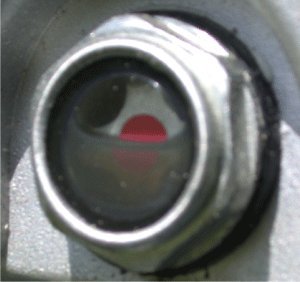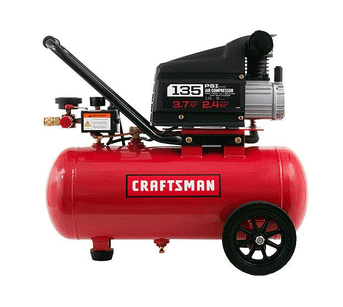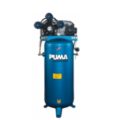Hey! This site is reader-supported and we earn commissions if you purchase products from retailers after clicking on a link from our site.
It can be a very difficult task to figure out how much oil an air compressor actually needs. Knowing the make and model of the compressor can help, but if you don’t have the manual, the task can be a bit more grueling.
I will provide as much information as I can to help you gauge how much oil you need and ways to check the oil levels!
Table of Contents
- How Much Oil Does an Air Compressor Need?
- How to Check Oil Level in Your Air Compressor
- What is an Air Compressor Oil Sump and Sump Plug?
- Overfilling vs. Underfilling Your Air Compressor With Oil
- FAQs (Frequently Asked Questions)
- Reader Questions and Responses
How Much Oil Does an Air Compressor Need?
It’s very difficult to determine how much oil a specific compressor pump requires without the manual. If there is no manual available, I advise that you contact the manufacturer directly or begin an internet search for the specifications of your air compressor and its model!
You should be able to obtain the manual for your model online, whether that will cost or not I do not know but, it will provide you with the exact amount of oil lubricant you should put into your specific air compressor.
Oil Quantity
You can expect to find air compressor oil drums readily available in the following common sizes:
- 1L
- 2L
- 5L
- 20L
Smaller compressors with say less than 1HP electric motors may only use around 6-8 oz of oil lubricant, however, others will use quarts. While other larger compressor systems may hold approximately 1 gallon (128 oz) of oil.
For information on Air Compressor Oil Types GUIDE – What Oil To Use In Air Compressor please visit our page. And if you’re looking for substitutes, visit our Air Compressor Oil Substitute – Alternatives Compared page!
I cannot simply give you an exact number on how much you need, though I can give you tips on how to check the oil amount inside your compressor which is vital in understanding how much oil the air compressor needs.
How to Check Oil Level in Your Air Compressor
The fact that oil quantity will vary by make, model, and size of the compressor makes the task more difficult. However, if you just want to know when you should stop filling up the compressor with oil, using the sight glass and/or dipstick should be sufficient. These are explained below!
Oil Sight Glass
The oil sight glass as shown below, allows you to have a look inside the compressor pump to check that there is enough oil inside the pump. This image below shows the oil is at the correct level halfway up the red dot, if you check your compressor oil sight glass you should look for a similar level to this.

Oil Dipstick
Like the majority of cars, air compressor pumps sometimes may not have a sight glass, so instead, look to use the oil dipstick. They can typically be found as part of the oil fill tube cap and extend down into the sump and oil.
The dipstick will have markings on it that indicate the oil level. Take the dipstick out, wipe it, and then “dip” it back into the sump. Then, check the dipstick for the oil level. This can help you understand whether you need to add more oil or not.

Alternative Method for Checking Oil
Some compressors don’t have a sight glass, unfortunately, though some have a dip-stick built into the oil fill cap instead. Check yours before doing anything so it will make refilling the oil to the correct level far easier. If neither is available then an alternative method is draining the oil from the tank into a reservoir and gauging the level that way.
How to Drain Oil From the Sump
Look for a plug that will thread out near the bottom of the compressor pump housing. This will be your oil drain. And yes, unless you are really careful, you will drip dirty oil all over everything. So pick your spot or layout something beneath the drain, one that won’t be damaged by oil leaking onto it in the case that you have a spill.
Now, drain the oil out into a reservoir that you can use to estimate how much oil was in your sump. That way you can put the same amount back in if you don’t have a sight glass or dipstick to measure the oil level as previously described.
What is an Air Compressor Oil Sump and Sump Plug?
An air compressor oil sump essentially is a dish that holds the air compressor lubricating oil when it is not circulating around the compression system via the use of a pump.
The sump contains a screw at the bottom which is a sump plug when unscrewed this allows for the oil to be drained out of the sump so that you can change or refill the compressor with new oil.
For information on How To Change Compressor Oil please visit our page!
Overfilling vs. Underfilling Your Air Compressor With Oil
These are two scenarios you should wish to avoid. Both can have very harmful effects on your air compressor system and its components, therefore, it is imperative that you fill your air compressor to the correct level!
As well, if the oil level is too high the oil can get whipped causing it to foam up and lose some of its lubricating properties. Therefore, it will gain volume and further increase your problems.
What Can Happen if You Overfill an Air Compressor With Oil?
If you overfill your air compressor with too much oil, it can have detrimental effects. Filling the sump to the top can likely result in serious and significant internal damage to your air compressor unit, which you should aim to avoid!
What Can Happen if You Under-Fill an Air Compressor With Oil?
Under-filling your air compressor may not provide an adequate amount of lubricant for the components of the air compressor to work sufficiently.
Under-filling can lead to premature wear of components due to the rubbing against each other that will occur without sufficient lubricant. This will result in reduced component and compressor lifespan along with providing you with greater maintenance costs.
FAQs (Frequently Asked Questions)
You should put in the amount of oil that is recommended by the manufacturer of your compressor. Check the manual or contact the manufacturer directly for this information. Otherwise, use the sight glass or dipstick on the sump to gauge the right amount.
Yes, and this can cause serious internal damage to the air compressor that should be avoided!
It may be possible, depending on whether your exact make and model allows you to use it. Contact your manufacturer directly before putting the 10W30 oil in your air compressor to ensure it is safe to do so. Visit our Air Compressor Oil Types GUIDE for more information on what oil to use for your air compressor.
You should check your oil sight glass or dipstick regularly to monitor when your oil levels are low, to then add more oil into the air compressor.
Additional oil reading:
- How to Change Air Compressor Oil – Guide to Replacing Compressor Oil
- Air Compressor Oil Types GUIDE – What Oil to Use in Air Compressor
- Air Compressor Oil Sight Glass – Oil Level Sight Glass Guide, Replacing & Reading
- Air Compressor Oil Related Issues – Oil Damage To Compressors
- Air Tool Oil Substitutes And Alternatives
- Air Compressor Oil Substitute – Alternatives Compared
- Oilless Air Compressors vs Oil Compressors – Differences Between Oil and Oil Free Air Compressors
- 10 Best Air Tool Oils
- 10 Best Oil Free Air Compressors
- How to Quiet An Oilless Air Compressor
- Air Over Oil – Air Over Hydraulic Cylinder Benefits & Uses
- Air Compressor Oil Breather / Crankcase Breather Cap Buying Guide
- Air Compressor Oil Separator Guide – Air Oil Separators & Oil Water Separators
- What Happens if an Air Compressor Runs Out of Oil?
- Air Comes Out of the Oil Fill Cap
- Compressor Has an Oil Issue
- Oil in compressor tank drain water
- Why air coming from our compressor has bad smell same as burned oil
- Why does oil come out of the oil fill tube?
Reader Questions and Responses
Too Much Oil Damaged My Air Compressor?
Question
I have a Craftsman 12-gallon 125 PSI 1 HP portable air compressor.
Last fall I changed the oil in it. Like an idiot, I didn’t read the manual first and overfilled it. After sitting all winter I fired it up to do some work around the house. After using it a few times I started noticing the odor of oil-burning coming from the compressor.
Now it will only build to 40 lbs. of pressure but keeps running with no increase in pressure. When I drained the tank I notice the water was mixed with oil.
When I turned the compressor off it did not bleed down so no leaks. Did I break it for good? What do I do? Thanks.

Response
Larry, offhand, I would guess that you have damaged the piston seals at least since you have lube oil mixed with water in the tank.
All oil lubed compressors wick oil into the tank with the compressed air. However, it shouldn’t be too much, and if you are seeing it, then I suspect that the sump oil has forced its way past the piston seals, then down the line into the tank.
See the troubleshooting page about compressors that run and don’t build pressure for more info.
Oil Coming Out Pump Oil Fill Vent – Too Much Oil?
Question
My compressor 60-gallon upright is only 2 years old don’t use it very much.
I was using it the other day blowing out a hay baler and when I got done there was oil blowing out the oil filler vent.
I have not changed the oil yet and the oil level is fine.
I have never had any trouble before also the pump and motor were pretty warm but never shut off due to overheating.
Response
Typically this scenario can be caused by an overfill of the oil sump and vibration is splashing oil up and out the fill vent.
Since you haven’t filled the oil recently, another reason this will occur is that your piston seals are leaking air, it gets past them down into the sump, the sump is vented to allow air to escape, and the escaping air is taking oil with it.
You mention that you were using the compressor to blow out a hay bailer. Did you move the compressor to get it to where you used it?
If the oil sump is full, moving the compressor could have allowed excess oil to migrate into the fill tube, and then, the vibration could be splashing oil out.
It depends on how much oil.
Reading the Compressor Oil Dipstick?
Question
How do you read the dipstick there is only a notch?

Response
It would have helped to know the make and model of the air compressor, Joe.
Regardless, if this were my compressor and there was only one notch on the wand of the dipstick, I would read that as the “full” level.
If you have a manual for the compressor, I expect that info would be there as well.
If you have any questions about how much oil your air compressor needs, please leave a comment below, with a photo if applicable, so that someone may help you!





